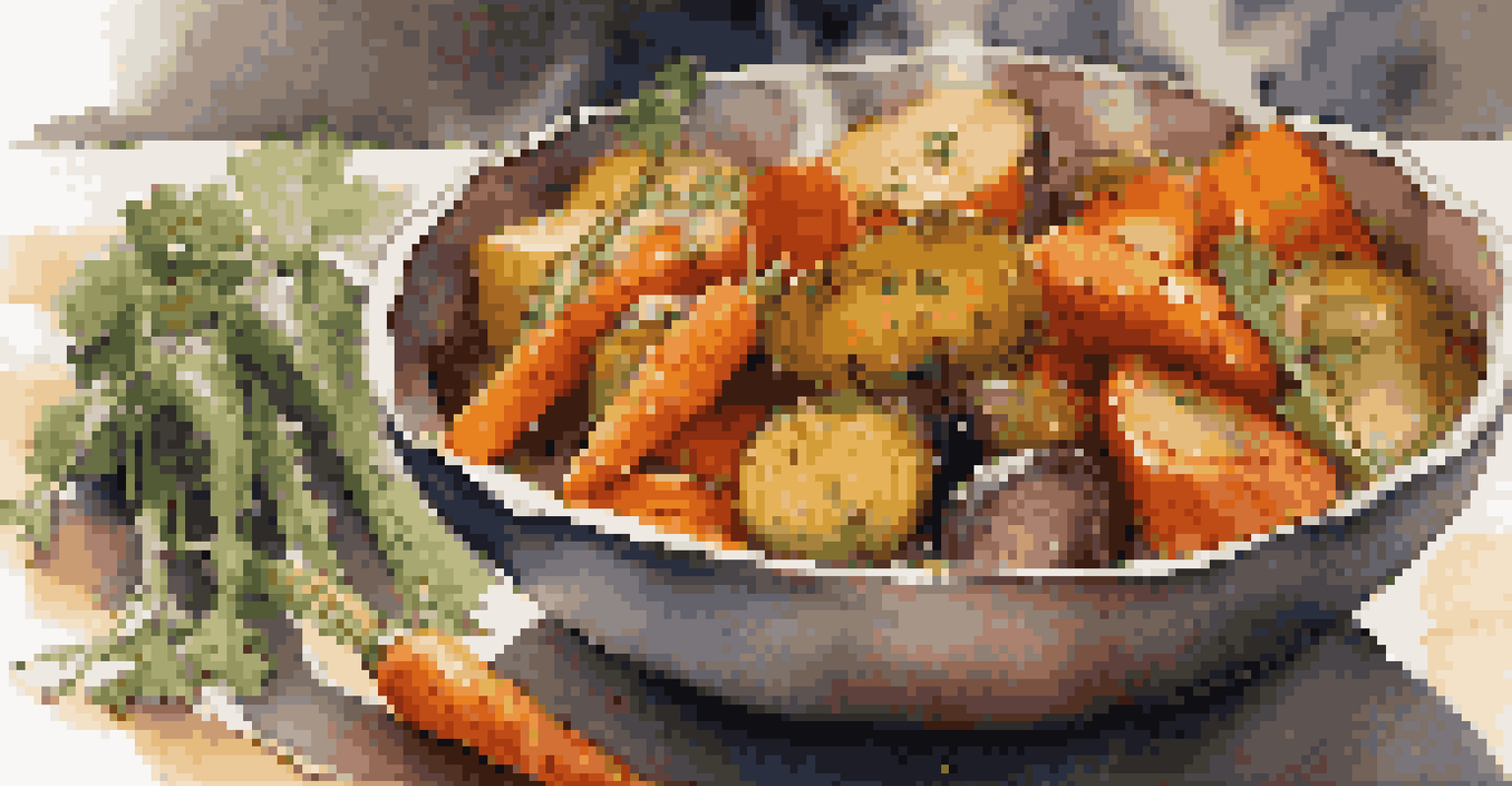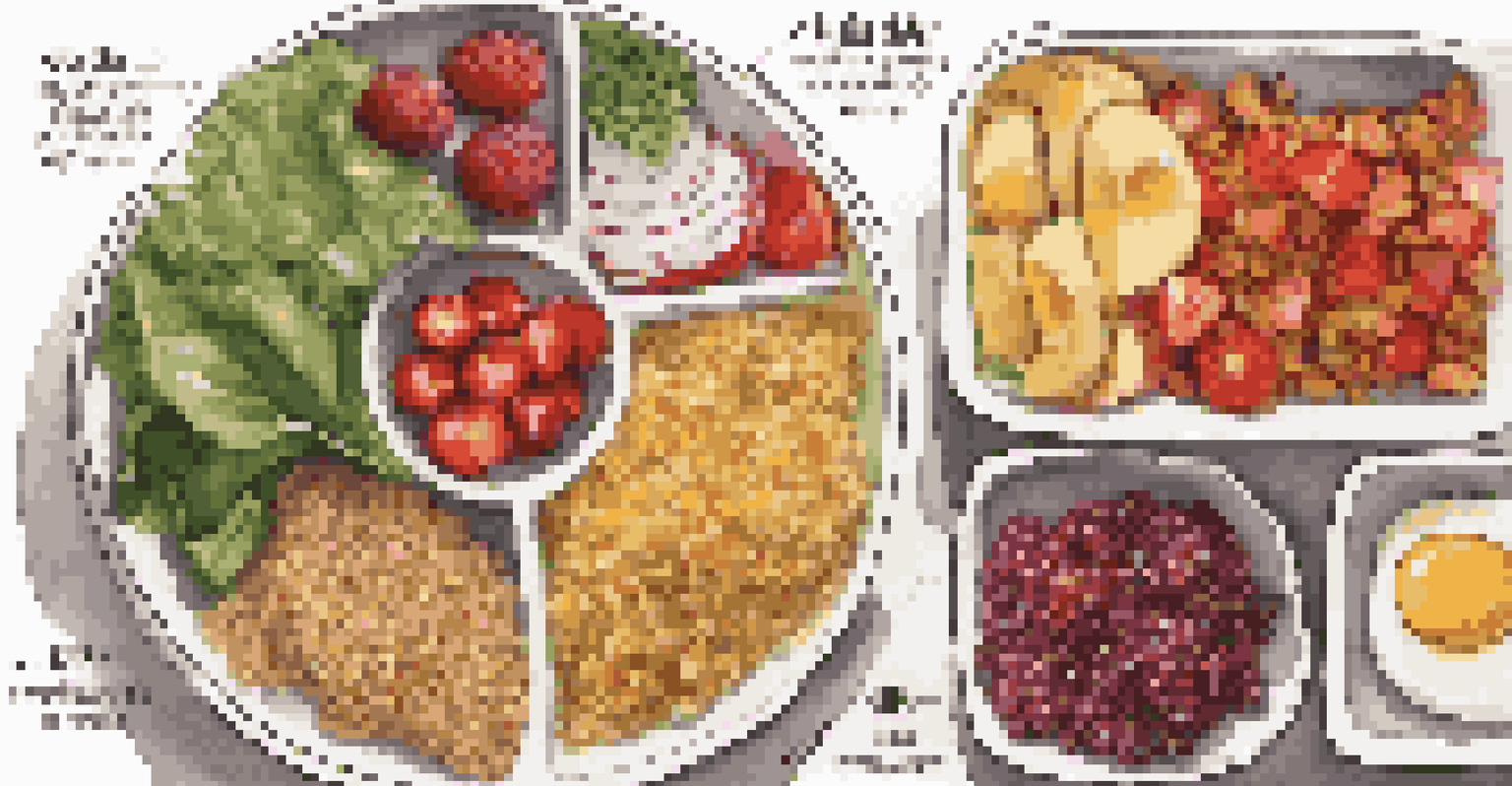Understanding the Role of Antioxidants in Nutrition

What Are Antioxidants and Why Do We Need Them?
Antioxidants are compounds that help protect our cells from damage caused by free radicals. Free radicals are unstable molecules that can harm our body, leading to aging and various diseases. Think of antioxidants as the body's superheroes, swooping in to neutralize these harmful agents and maintain balance.
Antioxidants are the body's defense system against the damage caused by free radicals.
Our body produces some antioxidants naturally, but we also need to obtain them from our diet. Foods rich in antioxidants include fruits, vegetables, nuts, and whole grains. By incorporating these into our meals, we bolster our defenses against oxidative stress.
In essence, antioxidants play a vital role in supporting our overall health and well-being. They help reduce inflammation, boost the immune system, and may even lower the risk of chronic diseases like heart disease and cancer.
Types of Antioxidants: A Closer Look
Antioxidants come in various forms, each offering unique benefits. The two main categories are enzymatic antioxidants and non-enzymatic antioxidants. Enzymatic antioxidants, like glutathione, are produced by our body, while non-enzymatic ones, such as vitamins C and E, must be consumed through food.

Vitamins C and E are perhaps the most well-known antioxidants. Vitamin C, found in citrus fruits and bell peppers, is water-soluble and helps protect cells in the bloodstream. On the other hand, vitamin E, present in nuts and seeds, is fat-soluble and plays a role in protecting cell membranes.
Antioxidants Protect Our Cells
Antioxidants are essential compounds that defend our cells against damage from free radicals, supporting overall health.
Then we have flavonoids and carotenoids, which are powerful plant-based antioxidants. Flavonoids are abundant in berries, tea, and red wine, while carotenoids, found in carrots and sweet potatoes, give these foods their vibrant colors. Together, they create a colorful palette of health benefits.
How Antioxidants Combat Oxidative Stress
Oxidative stress occurs when there's an imbalance between free radicals and antioxidants in the body. This can lead to cellular damage, contributing to various health issues. Antioxidants work by neutralizing free radicals, essentially calming the chaos caused by these unstable molecules.
Let food be thy medicine and medicine be thy food.
Imagine a busy intersection with cars zooming in every direction—free radicals can create a similar level of disorder in our body. Antioxidants act like traffic lights, directing the flow and ensuring that everything runs smoothly. This balance is crucial for maintaining our health.
By reducing oxidative stress, antioxidants can help lower the risk of chronic diseases. Research suggests that a diet rich in antioxidants may also improve longevity and enhance overall quality of life.
Natural Sources of Antioxidants: What to Eat
Incorporating antioxidant-rich foods into your diet is easier than you might think. Colorful fruits and vegetables are your best friends here. Berries, especially blueberries and strawberries, are packed with antioxidants, making them ideal snacks or additions to breakfast.
Leafy greens like spinach and kale are also fantastic sources of antioxidants. They can be tossed into salads, smoothies, or stir-fries for a nutritious boost. Additionally, nuts, seeds, and whole grains should not be overlooked; they provide essential nutrients along with their antioxidant benefits.
Diverse Foods Boost Antioxidants
Incorporating a variety of colorful fruits, vegetables, nuts, and grains into your diet enhances your antioxidant intake.
Don't forget about beverages like green tea and dark chocolate, which are rich in antioxidants too! By diversifying your food choices, you can enjoy a deliciously balanced diet while reaping the rewards of these health-promoting compounds.
The Impact of Cooking on Antioxidant Levels
Interestingly, the way we cook our food can affect its antioxidant levels. Some cooking methods, like boiling, can cause a significant loss of antioxidants, especially in vegetables. On the flip side, steaming or microwaving can preserve more nutrients and antioxidants.
Grilling or roasting can also enhance the flavors of foods while retaining their antioxidant properties. For instance, roasting vegetables can caramelize their natural sugars and bring out their delicious taste without sacrificing their health benefits.
It’s essential to find a balance in your cooking methods to maximize the antioxidant content in your meals. Experimenting with different techniques can lead to tasty discoveries while ensuring you get the most out of your food.
Antioxidants and Disease Prevention
Numerous studies have explored the link between antioxidants and disease prevention. For instance, a diet rich in antioxidants may reduce the risk of heart disease by preventing the oxidation of cholesterol in the bloodstream. This oxidation process can lead to plaque buildup in arteries, increasing the risk of heart attacks.
Additionally, antioxidants have been studied for their potential role in cancer prevention. They help neutralize free radicals that can cause DNA damage, a significant factor in cancer development. While more research is needed, the evidence suggests that a diet high in antioxidants is a step in the right direction.
Balance Nutrients for Optimal Health
A well-rounded diet that includes antioxidants along with vitamins, minerals, and healthy fats is crucial for maintaining overall health.
Incorporating antioxidants into your daily routine can be a proactive approach to maintaining your health. Rather than relying solely on supplements, focusing on whole foods can provide a more balanced intake of these beneficial compounds.
Balancing Antioxidants with Other Nutrients
While antioxidants play a crucial role in our health, it's essential to balance them with other nutrients. A well-rounded diet includes a variety of vitamins, minerals, fibers, and healthy fats, all of which contribute to overall health. Overemphasizing one nutrient can lead to imbalances and potential deficiencies.
For example, while vitamin C is an excellent antioxidant, it works best in harmony with other nutrients like vitamin E and selenium. These nutrients often work synergistically, meaning they enhance each other's effectiveness. Eating a diverse range of foods can help ensure you get all the necessary nutrients.

Ultimately, the key to a healthy diet is balance. By incorporating a wide variety of foods rich in antioxidants alongside other essential nutrients, you can support your body’s health in a holistic way.